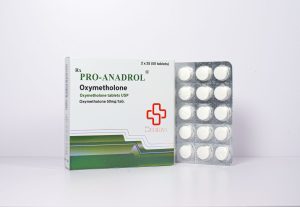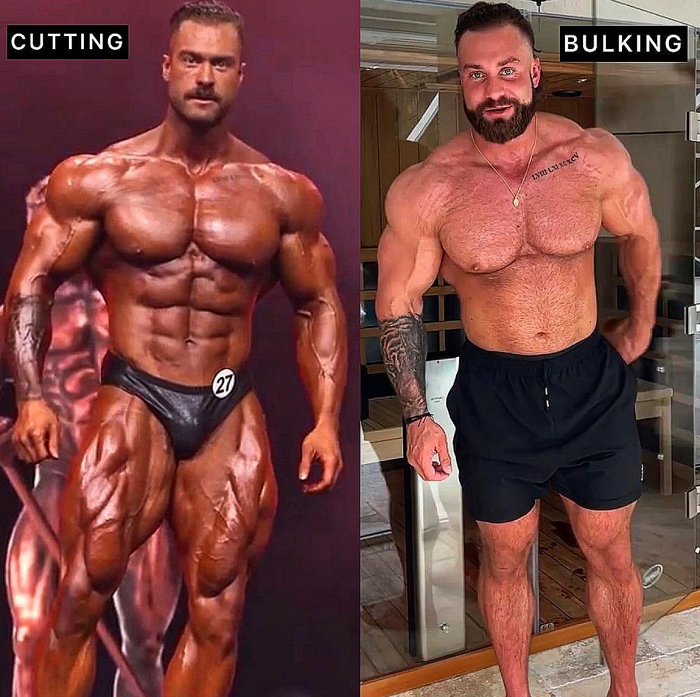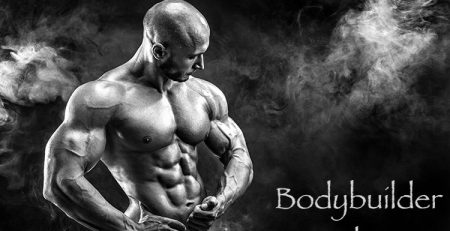It’s very important to understand that bulking up doesn’t come down to the steroids that you use and their dosage only. In fact, a bulking vs cutting cycle is different from one another in the diet and training program that you’re undergoing.
There are numerous people who can bulk up on traditional cutting steroids (like Winstrol, Anavar, and Primobolan) and the other way around. People who are cutting on traditional bulking steroids (like Dianabol, Deca, and Anadrol). Not to mention the fact that Testosterone is a very important steroid in all steroid cycles.
With this being said, it’s obviously important to pay attention to the steroids you use and their dosage during a bulking and a cutting cycle, but it’s most important to pay attention to your diet and workout plan. There are different diets and workout plans for different needs.
 Here we’re going to talk about how you could bulk up efficiently. Anabolic steroids would greatly help you in gaining muscles fast and efficiently, but they are becoming even more effective coupled with a proper bulking lifestyle. Generally, muscle growth is occurring at a lower rate than gaining fat, unfortunately. But with the help of steroids, you’re greatly reducing the fat gain vs muscle gain rate.
Here we’re going to talk about how you could bulk up efficiently. Anabolic steroids would greatly help you in gaining muscles fast and efficiently, but they are becoming even more effective coupled with a proper bulking lifestyle. Generally, muscle growth is occurring at a lower rate than gaining fat, unfortunately. But with the help of steroids, you’re greatly reducing the fat gain vs muscle gain rate.
But it’s very important for you to monitor your diet and training on a daily basis. If you want to minimize the fat gain and maximize muscle growth during a bulk, don’t “eat” steroids and expect growth. Steroids do help a lot, but muscles only grow with a proper lifestyle and consistency.
BUY BULKING ANABOLIC STEROIDS FOR SALE
Fat Gains During Bulking Cycles
It’s very possible for you to gain too much weight too fast during a bulk. While steroids greatly help increase the rate at which you add muscles, gaining too fast may result in gaining more fat than you would wish to gain.
That’s because muscles are growing at a rate (steroids increase that rate) and with all the excessive calories you eat – the body stores as fat.
Nonetheless, it’s important to understand that it’s fairly normal for a person to gain fat during a bulking cycle. There’s a “normal” amount of fat that you can gain during bulking cycles. That’s why, when you are in a bulk, expect some fat gains as well. You will be shredding that fat in the cutting cycles.
In bulking, your main aim is to gain as much muscles and strength. It’s obvious that gaining too much fat isn’t normal and is detrimental. But adding some fat during bulk up, as said, is normal.
Check below for some tips on training and nutrition that would help you bulk up effectively. Main factors you need to take into consideration when bulking.
Start Bulking When You’re Lean
It’s best to start your bulking cycle when you’re already in a lean state. This means that your body fat percentage is lower than 20%, ideally even lower. While it’s obvious that you can start at higher body fat percentages, remember that you would gain fat too. This means that your overall weight would increase, you’re going to pack on muscle mass, but your body fat is likely to increase too.
So, when you’re bulking up, there’s a chance that body fat is going to get too high as your body already has excessive amounts of fat in relation to lean muscles.
 Eat More Calories Than Maintenance
Eat More Calories Than Maintenance
When you are trying to gain muscles and weight during bulking cycles, your aim is to eat more calories than you are burning off. You need to take into consideration everything such as your lifestyle, physical activity, etc. That’s because it is fairly obvious a person burns more calories by training 6 times a week and has a physically demanding job compared to another person who is having a sedentary job and only works out 3 times a week.
It’s obvious you need to take into consideration your weight. So, for gaining weight, you need to eat in a caloric surplus. The same applies when you’re trying to lose weight as you’ll need to be in a caloric deficit.
So, calculate your maintenance calories based on your age, gender, lifestyle activities, height, and obviously weight, and try to eat more than that by about 10-20-30%. Eating more would likely result in more fat gains. Eating less wouldn’t help in gaining weight and muscles.
Eat Enough Protein
If you’ve ever stepped into a gym you heard of someone talking about protein. You’ve heard about protein even if you are unrelated to the fitness world. That’s because I can’t stress enough how extremely important proteins are for your muscles. Not eating enough protein would result in muscle loss!
So, please make sure you’re eating enough protein. That’s extremely important for your muscle maintenance, muscle recovery, and muscle growth! Your aim is about 1 gram of protein per pound of body weight (around 2 g per kg). When you’re bulking, make sure to eat protein on a daily basis exactly to your body weight (in lbs or double it up if you calculate in kg).
Eating too much protein isn’t a good idea either. While a slight surplus won’t be detrimental (nor effective, because the body won’t use it), eating too much protein can lead to health issues.
Carbs as Training Fuel
We all know that eating too many carbohydrates would lead to fat gains, but undereating carbohydrates would lead to a lack of energy and strength required for training. Carbs are the preferred fuel for muscle tissues and they greatly help “fuel” up your hard training.
The body does have energy from fats and proteins, however, carbohydrates are the preferred source of energy that helps you fuel your high intensity weight training. The training type that you need during bulking cycles.
High amounts of carbs are not great for cutting, but for bulking – you’re going to need it.
I recommend starting by consuming about 3 grams of carbs per pound of body weight. That’s why, when you’re bulking up, you need foods that are a great source of carbs such as bread, rice, potatoes, pasta, grains, and so on and so forth.
 Train More Frequently
Train More Frequently
While it’s not a good idea to train too often because it could lead to overtraining (excessive soreness, low stimulus work sets, and even injury) that can actually make you LOSE muscles, I would still recommend you to train more frequently rather than training too much in a single session.
With this being said, it’s much better to train 6 times a week for one hour, rather than 3 times a week for 2 hours. By training more frequently, you can spread up the total work sets across the training sessions.
This would reduce the total sets of the specific muscle group you’re training per session allowing you to workout with higher stimulus, and higher load without stressing the body too much. You wouldn’t have as severe muscle soreness and injury risks in training less but more frequently rather than training the muscle group once a week with very high intensity.
Train More Volume
During a bulking phase, you need to have a progressive workload. This means that you need to train more frequently and in progressive higher volume. As I said earlier, you’re eating in caloric surplus with enough carbohydrates and protein. This makes you stay in an overall well-fed state which helps you recover fast. Therefore, you are able to train in higher volumes. You can increase the total weekly sets.
It’s very important for you to understand the training volume ranges that are effective specifically for you. Do it by training about 12-20 total weekly sets range. Monitor the recovery, progression, and soreness that you experience. Increase or decrease based on your results.
I would recommend starting with a program in the lower end of the range and then increasing the total volume once a month. You’ll need to progressively increase work volume. Pretty much as you’ll need to progressively increase carbs, proteins, etc. as you gain weight.
Train a Variety of Rep Ranges
Indeed, you can grow muscles when training with most rep ranges. Nonetheless, when you’re training for a while and you train frequently, especially in high volumes and almost always at most rep ranges, I would recommend balancing out the volume, intensity of the training, and the time your body needs to recover.
Most lifters suggest that training movements are anywhere between the 8-15 rep range. It covers most of the bases for muscle growth. Less is not enough, more is ineffective (you should add more weight).
Yet, when you train with compound exercises (bench press, deadlifts, squats) then 5-10 reps range is sufficient.
Anyhow, people are different. Some suggest that rep ranges between 5-10 and big weights are better than 20-30 rep ranges with lower weights for them. For others, it’s the other way around. I would recommend experimenting with 5-10 rep ranges, then 10-20; then 20-30, and see which one is better for your needs.
 Train Until Your Muscles Can’t Take Any More
Train Until Your Muscles Can’t Take Any More
When you are training for growing muscle mass (hypertrophy) it’s highly important to train with balanced out intensity and rep ranges until you can push the muscles to almost near failure.
While it’s important to push muscles to the limit, it’s important to continue repping perfectly. Do push your sets hard, but not to that point when you lose your technique. It’s not only inefficient, but it greatly increases the risk of injury!
Get Enough Sleep
As you can guess, sleep is playing a vital role in your overall weight gain and muscle growth goals. Sleeping is extremely important for the recovery of your muscles. And while you’re “breaking” your muscles in the gym, they are growing with proper recovery and nutrition.
Therefore, the fact that you should sleep for 7-8 hours or even more a day isn’t just what doctors say. That’s extremely important for recovery. Sleeping less would make a huge difference in your nervous system, muscle gains, etc.
Enough sleep provides you with enough hormones such as testosterone and HGH (human growth hormone) that help you grow muscles. Even if you get these hormones exogenously, sleep has numerous other important benefits. As you can guess.
 Track Your Progress
Track Your Progress
When you’re bulking up, try to keep track of your progress. Track the rate of weight gain. Can even take before and after pictures.
With the help of anabolic steroids and a proper lifestyle (everything mentioned earlier), you could add about 1-2 lbs per week. Adding more most likely means you’re adding more fat than you should. Unless you’re a large individual using steroids.
Bulking Cycle – In The End
A bulking cycle is very effective for gaining muscles and strength. It’s important to understand that adding some fat during a bulking cycle is expectable. But adding too much fat during this cycle means you’re doing something wrong.
By following the tips I mentioned above, it could greatly help you maximize your bulking phase. It’s important to understand that using steroids for bulking is by far not enough. They need to be coupled with a proper bulking lifestyle.
This means a proper diet (enough proteins, fat, and carbohydrates with calories about 10-20% above maintenance), proper workout (progressive workload and training for hypertrophy) as well as enough sleep!
- PS: If you have recovery issues (your body recovers too slowly) and/or appetite issues (you can’t eat enough calories) then anabolic steroids greatly help with it. You could also try weight gaining shakes and supplements. Add vitamins and minerals that can help you out too in your local supplements shop. But if you search for quality anabolic steroids for sale for low prices – Supps-For-Life.to is your best shop!















Leave a Reply
You must be logged in to post a comment.